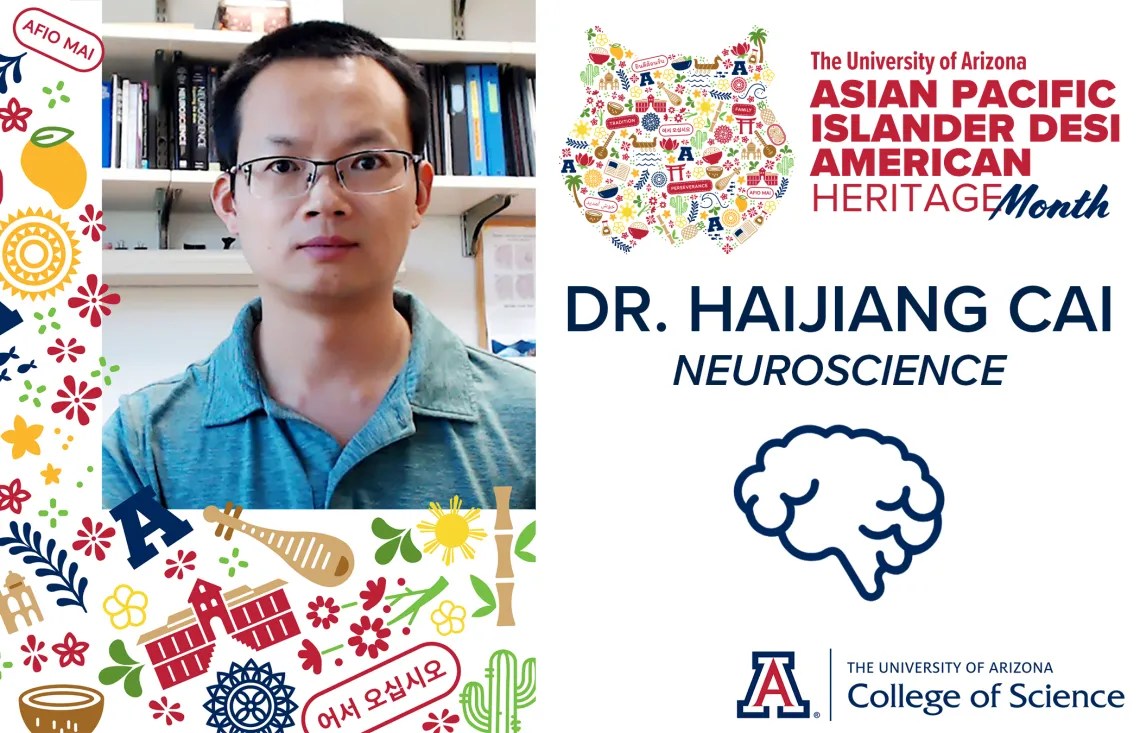APIDA Heritage Month Faculty Spotlight: Dr. Haijiang Cai

The College of Science is celebrating APIDA (Asian, Pacific Islander, and Desi American) Heritage Month by featuring some of the College’s outstanding faculty with Asian roots. Our first featured faculty member is Dr. Haijiang Cai, an Associate Professor in the Department of Neuroscience.
The College of Science spoke with Dr. Cai to learn more about his journey to the University of Arizona, some of his favorite memories around family, and the importance of education.
You can learn more about Dr. Cai and his work here.
Dr. Haijiang Cai
Associate Professor, Department of Neuroscience
College of Science: Tell us a little about yourself, your background, and your journey to the University of Arizona.
Cai: I was born and grew up in China. I received my BS in 2001 from the University of Science and Technology of China, and my PhD in 2007 from the University of Southern California. Before joining the University of Arizona in 2015, I was a postdoctoral fellow at Caltech. My research interest is understanding how brain neural circuits control behaviors, with a focus on studying the interaction between eating and emotional behaviors.
COS: When looking back on your childhood and spending time with family, are there any favorite traditions or memories that stick out to you?
Cai: One tradition common to most Chinese families is their emphasis on child education. They believe that a good education can lead not only to a better life for themselves but also for the world, so they invest as much as they can in the education of their children. I think most Chinese families still maintain this tradition when they immigrate to the US.
COS: Who are some of the people who have made the greatest impact on your life?
Cai: Many people have made an impact on my life over the years. One such person is my mom, whose education stopped at the 5th grade due to the Cultural Revolution in China. However, she loves reading, primarily through self-learning—she devours any book she can find. Her habit influenced and was passed on to me. Due to the limited resources in China at that time, which is likely true for most people in many places, reading is the most important way to acquire knowledge and learn beyond one's family and friends.
COS: What was it that drew you to your area of research and expertise?
Cai: I was initially interested in the human mind during college. However, after several years of study, I realized that it was too far away from reaching with research. Therefore, I focused on more fundamental pursuits, such as understanding how the brain controls behaviors. For instance, how brain cells integrate sensory information to decide whether to eat or not. It may be surprising to many people that even for such simple questions, we still have very limited knowledge about the underlying neural mechanisms. For example, we still don’t really know why patients with eating disorders have anxiety or depression, and how these conditions interact with eating behaviors.
COS: What is your favorite part of being a scientist?
Cai: I think the favorite part of being a scientist is that I have the freedom to explore any question that I think is interesting.

